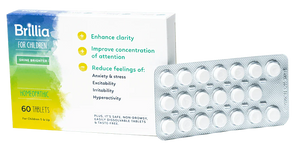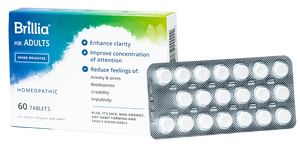Though it’s a stretch to say sugar causes ADHD, there is evidence that shows the sweet substance can exacerbate symptoms like inattention, hyperactivity, and restlessness.1 In some cases, sugar has even been shown to provoke aggressive behavior in kids with ADHD.2
Explore the relationship between sugar and ADHD, including how sugar acts in the body, why it exacerbates symptoms, and review tips on how to curb sugar intake in your own home.
The Science Behind Sugar & the Body
Americans consume about 270 calories of sugar each day, amounting to around 17 teaspoons a day, which is more than the recommended limits of about 12 teaspoons. Even if you may be trying to avoid obvious sugars like candy bars or soft drinks, you may not know that sugar is often hiding in unexpected foods like ketchup, pasta sauces, yogurt, salad dressing and more. Why should this worry us? It all comes back to how sugar acts in the body.
Sugar, a carbohydrate, has a big job. The body converts carbohydrates into energy, which fuels your cells. Sugar also causes the brain to release the feel-good chemicals dopamine, which may explain why so many of us seek out sweet foods. When we consume sugar, the pancreas releases insulin, which sends a message to our liver and muscles to store the unused energy for later use.
However, when we consume too much sugar, especially in the form of added sugars found commonly in processed foods, it can wreak havoc on our system. According to Harvard Health, too much sugar can lead to higher blood pressure, inflammation, weight gain, diabetes, and fatty liver disease, which can all lead to increased risk of heart attack and stroke.3 This goes above and beyond the obvious negative effects on our teeth, such as cavities, and our mood (the dreaded sugar crash). But what happens when you pair sugar with ADHD?
Can Sugar Make You More Hyperactive?
There is a lot of conflicting evidence online about the link between sugar and hyperactivity. While some experts call the link a myth, other studies show that sugar does in fact exacerbate hyperactive behavior.4 According to the National Library of Medicine, this may happen because refined sugars and carbohydrates enter the bloodstream quickly, causing rapid changes in blood sugar levels that lead to more activity.5 And one study shows that sugar intake worsens hyperactive symptoms due to an increase in the chemical epinephrine, which occurs when the pancreas releases massive amounts of insulin.6
The classic symptoms of hyperactivity like inattention, poor impulse control, and excessive movement may also be accompanied by aggressive behavior. A study conducted by the University of South Carolina found that the more sugar hyperactive children consumed, the more “destructive-aggressive and restless” they became.7
Dietary Patterns & ADHD
Research shows that healthy dietary patterns, characterized by a greater intake of fruits and vegetables, had a “protective” effect when it came to ADHD.8 Conversely, unhealthy dietary patterns were found to put subjects more at risk for developing ADHD symptoms. In addition to following a low-sugar diet, experts recommend following a diet low in fat and carbohydrates and high in fatty acids and minerals to decrease symptoms.9
But eating the right foods is only part of following a healthy diet. Eating regularly, and ideally at the same time every day, can also help improve attention and minimize hyperactive behavior. One study showed that even when children without ADHD skipped breakfast, their attention deteriorated more quickly than children who had eaten a simple breakfast of whole-grain cereal and milk.10
However, eating regularly can be a challenge for people taking stimulant medications. One of the most common side effects of drugs like Adderall and Ritalin is loss of appetite. Choosing a medication that does not affect your appetite, such as a homeopathic medication like Brillia, can help you reduce symptoms of hyperactivity and inattention without affecting your appetite or causing any weight changes.
ADHD, Sugar, & Caffeine
Many sugary foods and drinks, like sodas, energy drinks, and candy bars also contain caffeine, which can be just as detrimental to those with attention issues. Like sugar, caffeine also stimulates dopamine production and acts as a stimulant. Though caffeine can increase focus when used in moderation, too much of it can lead to anxiety and irritability, which are symptoms that often coincide with ADHD. Caffeine can also disrupt sleep, especially when consumed too late in the day, and lost sleep is known to make ADHD symptoms worse.
How to Curb Your Sugar Intake
Despite the evidence linking sugar to ADHD, it’s not feasible or recommended to cut out sugar completely. After all, sugar is found in fruits, vegetables, and other healthy whole foods. But limiting your intake of added sugars is always a good idea. Some other ways to curb your sugar intake include:
- Limit processed foods, which almost always have hidden sugars lurking in them.
- Replace sugary sodas and fruit juices with low-sugar alternatives like teas or fruit-infused water.
- Get in the habit of reading nutrition labels and opting for choices with no added sugars or low in sugar.
- Cut back on sugar slowly to avoid cravings. Even small positive adjustments can make a big difference over time.
How to Seek Further Help for ADHD
Following a healthy diet can make a massive difference in your ADHD symptoms and your overall health, but there are many other ways to keep your symptoms in check. Brillia’s Five Pillars consist of simple behavioral changes that can make a massive difference in your attention, focus, and general well being. These include getting adequate sleep, controlling screen time, and practicing mindfulness techniques.
If you find that you still need support, try Brillia, a homeopathic medication that reduces symptoms like anxiety, inattention, restlessness, hyperactivity, and irritability without harsh, synthetic chemicals or harmful side effects. The medication stops these symptoms from occuring in the body while enhancing clarity and focus through targeted antibodies. Brillia can be used in conjunction with ADHD medications or as an alternative to these medications and is available without a prescription or official diagnosis.
Find out more about how Brillia works and discover more resources on managing symptoms of ADHD at the Brilli(ance) Resource Center.
We’ll share helpful tips, the latest studies and personal experiences.







